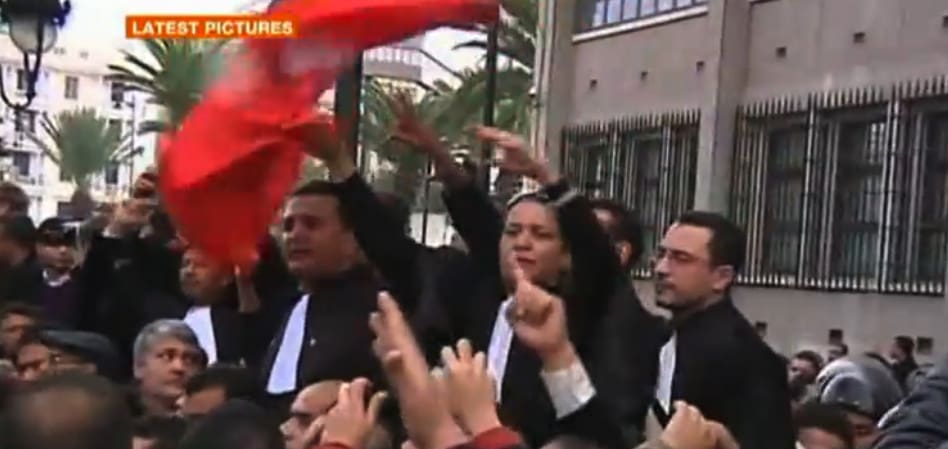With their black gowns and white cravats, Tunisia’s lawyers were perhaps unexpected allies of the teenagers who took to the streets in late December. But in the video clips shot on mobile phones that cropped up on Facebook and YouTube they were seen picketing courthouses, marching, holding placards protesting the killing of protesters, and chanting slogans for a “Free Tunisia!” In one clip, a lawyer on a soapbox berated the regime of then-president Zine el Abidine Ben Ali. When an elderly woman in traditional white headscarf wanted to have her say too, the lawyers hauled her up onto the soapbox; her generation, who lived through Tunisia’s struggle for independence from France in 1956, is well-respected.
httpv://www.youtube.com/watch?v=WXRqazftiMw
The combative spirit of Tunisia’s corps of lawyers dates back to that era of the anti-colonial struggle and beyond, the country’s most senior dissident lawyer, Judge Mokhtar Yahyaoui, explains in his modest Tunis apartment, just a few days after the fall of Ben Ali on January 14. Tunisia’s bar association, the National Order of Lawyers [Ordre National des Avocats] is more than 100 years old, he says. In the 1930s to 1950s many of its members were Frenchmen, or Jewish Tunisians, often redoubtable defenders of their Muslim fellow-countrymen prosecuted for nationalist activities. However dark the reality has been, Tunisians are proud of their country’s legal tradition – if only it was allowed to operate without interference.
Taking power in 1987, Ben Ali trumpeted himself as a noble, reformist leader, but the hopes he encouraged would soon be disappointed. The bar association would be one of the few professional bodies or trade unions to retain its independence through the darkest years of the Ben Ali regime, resisting the Machiavellian tactics of infiltration and co-option that effectively neutered others. The judges’ body, the Association of Magistrates (Association des Magistrats Tunisiens), had a more difficult time defending its autonomy.
In 2002 Judge Yahyaoui addressed a courageous open letter to the President, telling him that “Judges who takes orders from above have… imposed a spirit of dependence and submission, identifying themselves zealously with the political regime in place. Their objective is to create systematic a confusion between the regime and the state.”
For French academic and Tunisia specialist Béatrice Hibou, lawyers – like it or not – found themselves on the frontline under Ben Ali: “They were confronted daily, through their clients, with policing practices, arbitrary administrative decisions, techniques of control and surveillance, confiscations and intimidation.” Lawyers who were members of Ben Ali’s RCD party of course distanced themselves from defending anyone with dissident opinions, but others, often far from being Islamist sympathisers, continued even through the period of harshest repression of Tunisia’s Islamists in the 1990s, to make sure such defendants had serious legal representation.
A veteran of the independence struggle, the late Mohamed Chakroun, was bar association leader in that decade. He fostered a sizable core who believed that “every defendant should find a lawyer,” Yahyaoui says. “It’s a tradition that is well-anchored now, especially among the younger lawyers; many of them like to prove their level of commitment by defending in such cases.” While Islamist sympathisers were, and are, a minority among the country’s approximately 8,000 lawyers, diversity of opinion survived among lawyers even as it was frozen out of wider public discourse. And as Tunisia’s human rights organisations provided a (limited) substitute arena for political activity – no space was allowed for any real multiparty politics – there was a natural intersection between human rights advocacy and the legal profession.
For those lawyers who really stuck their neck out, such as human rights lawyer Radhia Nasraoui, the methods of intimidation were multiple; but when lawyers were actually imprisoned, strikes by their colleagues often forced the regime to back down.
Independent lawyers valued their links with bar associations abroad and particularly in the United States – even as on a macro-political level the US tacitly endorsed Ben Ali’s hard line against Islamism. “The US is governed by lawyers” in Congress and the White House, one such Tunisian lawyer told a visitor approvingly in 1999, with Bill Clinton in the White House. For Judge Yahyaoui it has been the efforts of American diplomats, reflecting pressure from US lawyers’ associations, as well as support from Holland, Belgium and Switzerland, that has kept him out of prison in the nine years since he wrote his open letter. But he deplores the lack of solidarity from any judges’ associations abroad. He has been prevented from exercising his profession, has had assets confiscated, and has been deprived of a passport – conditions it is hoped will now be speedily reversed.
In the post-Ben Ali era, judicial independence will be a hot issue if the country’s bar association has its way. Along with the Association of Magistrates and Yahyaoui’s own Tunisian Centre for the Independence of Justice, it addressed a communiqué on this issue to interim Prime Minister Mohamed Ghannouchi on January 17.
Ghannouchi, whom a large swathe of Tunisian public opinion has rejected as representing a continuation of the Ben Ali regime, responded that the issue would be prioritised. “We don’t believe in promises any more,” comments Judge Yahyaoui. “We believe in acts.” Judge Mokhtar Yahyaoui’s blog is at www.tunisiawatch.com
This post is a contribution to LoR from Eileen Byrne. Eileen is a London-based journalist specialising in North Africa. She was The Economist correspondent in Morocco from 2001 to 2004, and is currently reporting from Tunis for The Financial Times. She has previously reported from Venezuela, where she worked on the Daily Journal, Caracas, and from Mexico City. She has a postgraduate degree in History from the Middle East Centre, St Antony’s College, Oxford, and a first degree in History with Arabic from Manchester University.
